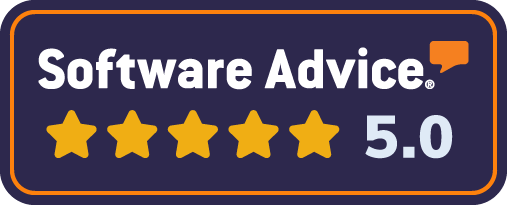At Emplibot, we’ve seen a surge in AI-powered marketing strategies revolutionizing the industry. The potential for AI to transform marketing is immense, and savvy entrepreneurs are seizing this opportunity.
If you’re wondering how to start an AI marketing agency, you’re in the right place. This guide will walk you through the essential steps to launch your agency successfully and capitalize on this growing market.
Contents
ToggleHow to Define Your AI Marketing Agency’s Focus
Exploring AI Marketing Technologies
The first step in defining your agency’s focus requires a thorough research and understanding of the latest AI marketing technologies. The global AI market is expected to reach $997.77 billion by 2028 (Grand View Research), with marketing as a significant beneficiary. This growth presents numerous opportunities for agencies specializing in AI-driven marketing solutions.
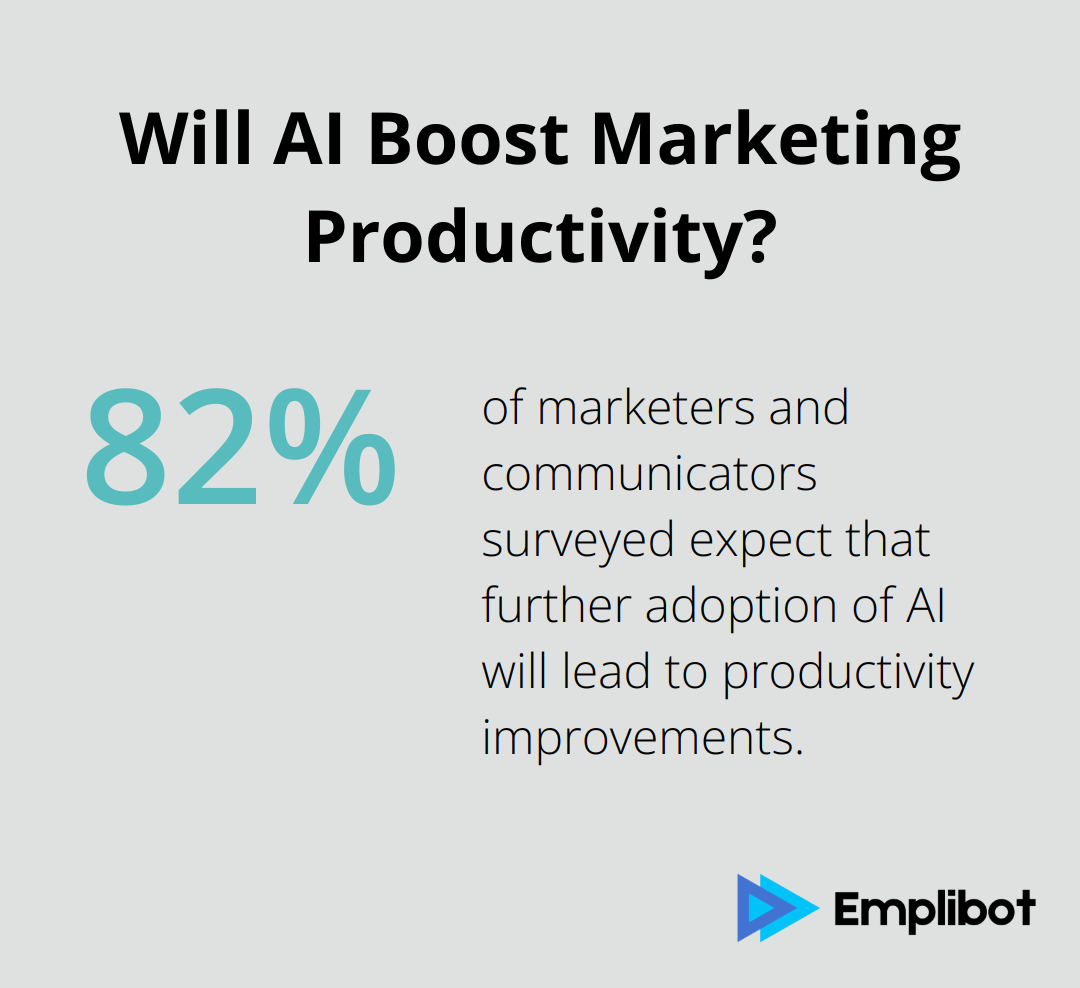
Key technologies to consider include:
- Natural Language Processing (NLP) for content creation and optimization
- Machine Learning algorithms for predictive analytics and customer segmentation
- Computer Vision for image and video analysis in social media marketing
- Chatbots and conversational AI for customer service and engagement
An understanding of these technologies will help you determine which ones align best with your expertise and market demand.
Identifying Your Target Market
After you familiarize yourself with AI marketing technologies, the next step involves identifying your target market. This process requires an analysis of different industries and business sizes to determine where your AI marketing services can have the most significant impact.
E-commerce businesses often benefit greatly from AI-powered personalization and recommendation engines. Personalization can lead to a 20% to 30% increase in conversion rates (Epsilon). This statistic could serve as a powerful selling point when targeting e-commerce clients.
You might also choose to focus on small to medium-sized businesses (SMBs) that lack the resources to implement AI marketing strategies in-house. 82% of marketers and communicators surveyed expect that further adoption of AI will lead to productivity improvements, indicating a growing need for AI expertise among SMBs.
Crafting Your Unique Value Proposition
The final piece in defining your agency’s niche involves developing a compelling unique value proposition (UVP). Your UVP should clearly communicate how your AI marketing services solve specific problems for your target market.
For B2B companies, your UVP might focus on how your AI-driven lead generation strategies can increase the quality of leads by 50% (HubSpot). This concrete benefit can set you apart from traditional marketing agencies.
Emphasizing tangible results is essential. While some agencies might focus on content creation and distribution, others could highlight their ability to reduce marketing costs by 40% through predictive analytics (Gartner research).
Your UVP should evolve as you gain more experience and as AI technologies advance. A regular reassessment of your position in the market and adjustment of your offerings will help you stay ahead of the curve.
Staying Ahead of AI Trends
The AI marketing landscape changes rapidly. To maintain a competitive edge, you must stay informed about the latest trends and developments in AI marketing. This knowledge will allow you to offer cutting-edge solutions to your clients and position your agency as a thought leader in the industry.
Try to attend AI marketing conferences, participate in webinars, and engage with industry publications. These activities will not only keep you informed but also provide networking opportunities that could lead to partnerships or new client relationships.
As you move forward in defining your agency’s focus, the next step involves building a strong team and infrastructure to support your AI marketing services. This process includes hiring the right talent, investing in necessary tools, and establishing strategic partnerships.
Building Your AI Marketing Dream Team
Recruit Top-Tier Talent
The success of an AI marketing agency depends on its team. You must recruit individuals with a blend of technical expertise and marketing acumen. Data scientists experienced in marketing analytics can translate complex data into actionable insights for clients. AI specialists who understand machine learning algorithms and natural language processing are essential for developing cutting-edge marketing solutions. Marketing experts with a strong grasp of digital strategies and a willingness to embrace AI technologies will complete your team.
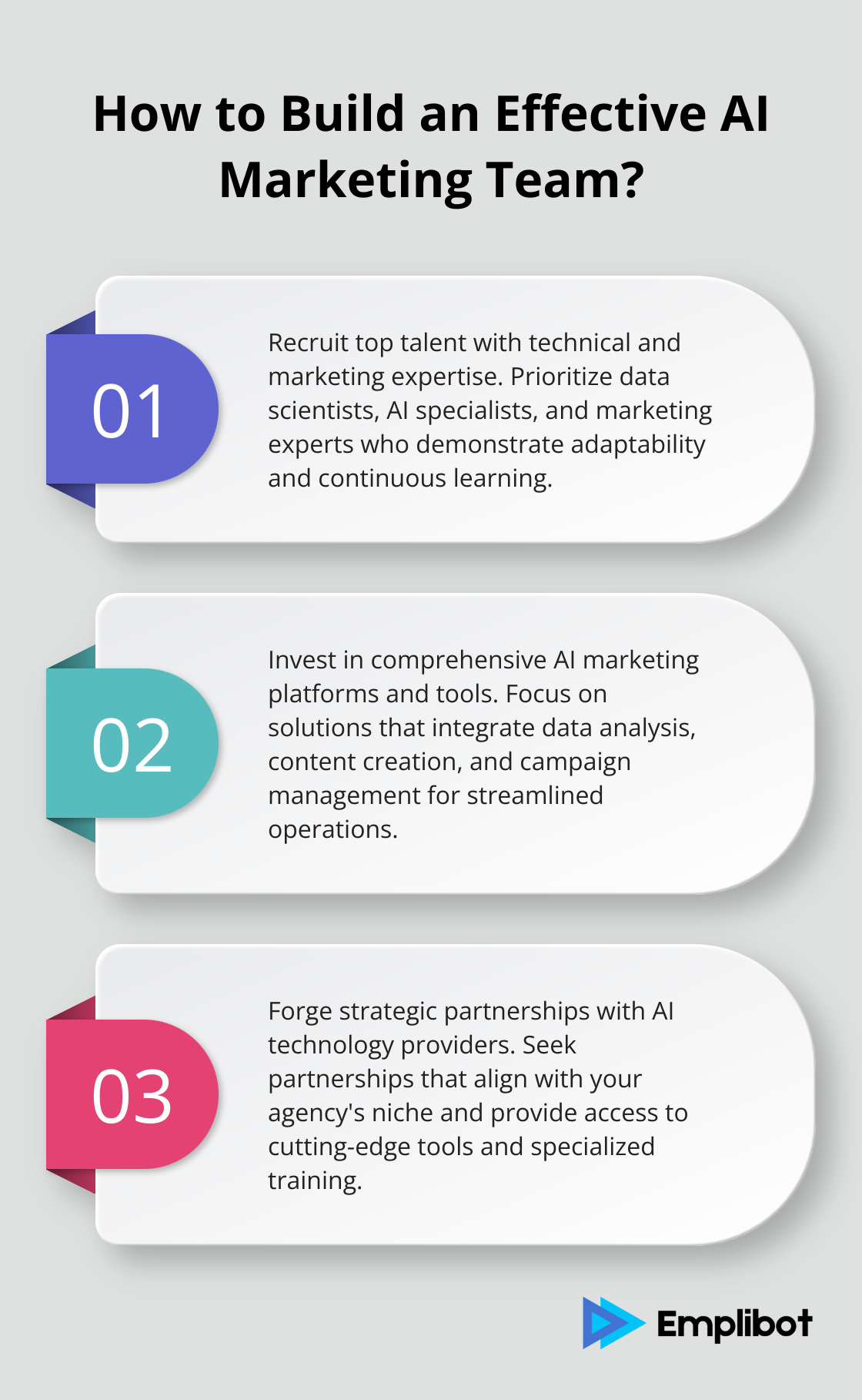
When hiring, prioritize candidates who demonstrate adaptability and a passion for continuous learning. The AI field evolves rapidly, and your team needs to keep pace. A LinkedIn Learning report suggests that continuous learning in AI trends and technologies can significantly enhance service offerings and customer satisfaction.
Invest in AI Tools and Software
Equip your team with the right tools to deliver top-notch AI marketing services. Invest in a comprehensive AI marketing platform that integrates various functions such as data analysis, content creation, and campaign management. This approach can streamline operations and reduce the need for multiple disparate tools.
Consider platforms that offer predictive analytics capabilities. AI in marketing can boost results through enhanced content, streamlined operations, and more personalized, engaging campaigns and customer experiences.
Don’t overlook project management and collaboration tools. These are essential for coordinating your team’s efforts and ensuring smooth communication with clients. Look for solutions that integrate well with your AI marketing stack to create a seamless workflow.
Forge Strategic Partnerships
Establish partnerships with AI technology providers to give your agency a competitive edge. These partnerships can provide access to cutting-edge tools, specialized training for your team, and even lead to collaborative projects that showcase your agency’s capabilities.
Look for partnerships that align with your agency’s niche and target market. For example, if you focus on e-commerce clients, partnering with a provider of AI-powered recommendation engines could be highly beneficial. Such partnerships can enhance your service offerings and open new opportunities for growth.
Building a strong AI marketing team and infrastructure is an ongoing process. As the field evolves, your team’s skills and your agency’s toolset should evolve too. Stay agile and always look for ways to improve your capabilities. This approach will position your agency as a leader in the dynamic world of AI marketing.
The next step in launching your AI marketing agency is to create compelling strategies for your clients. Let’s explore how to develop data-driven approaches, implement AI-powered personalization techniques, and utilize predictive analytics for campaign optimization.
How to Create Winning AI Marketing Strategies
Leverage Data-Driven Approaches
The foundation of any successful AI marketing strategy is data. Help your clients collect and consolidate data from various sources, including website analytics, CRM systems, social media platforms, and customer surveys. This comprehensive data set will fuel your AI algorithms and provide valuable insights.
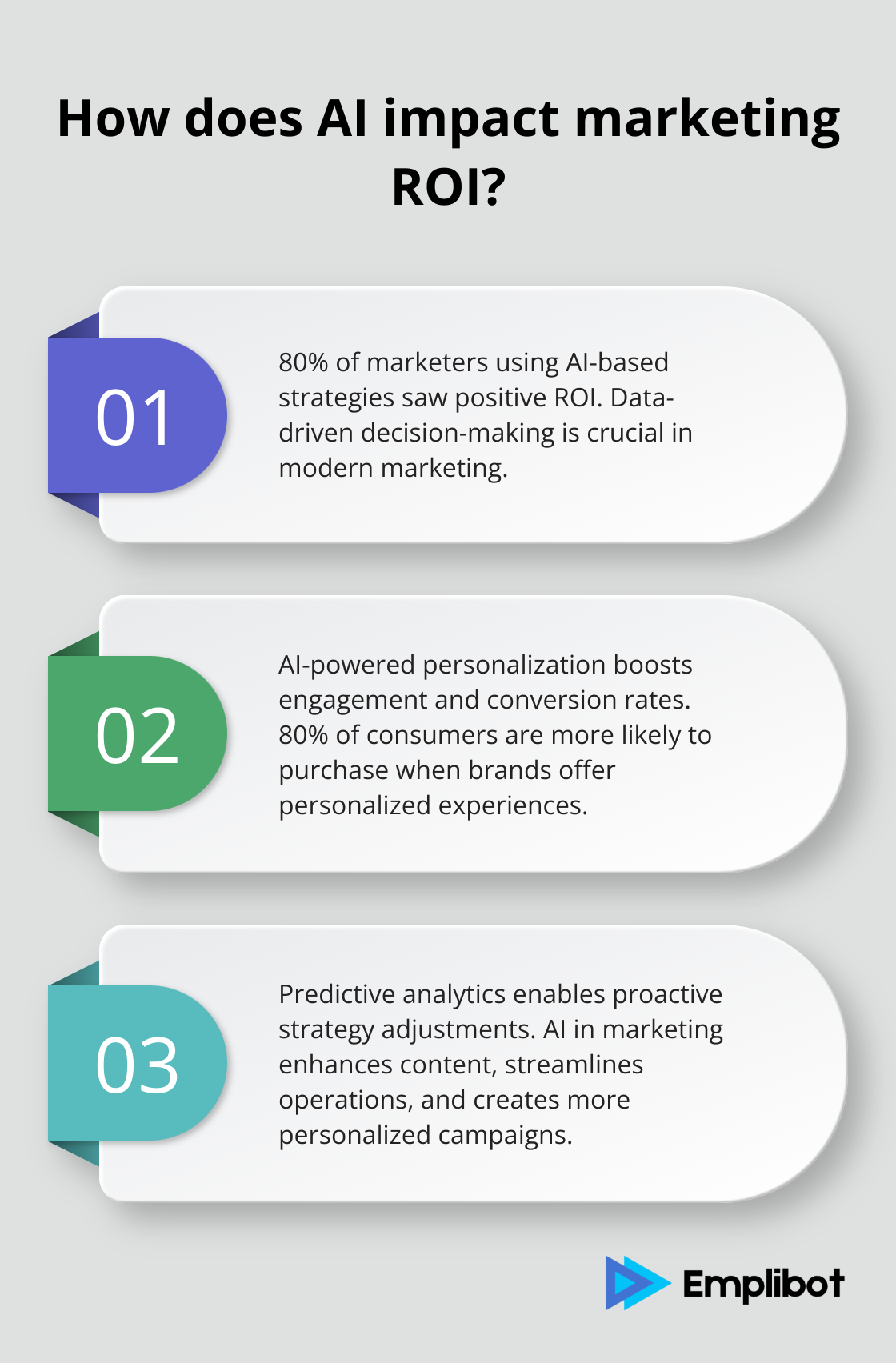
Use AI-powered tools to analyze this data and identify patterns, trends, and customer behaviors. You might discover that a client’s customers respond best to email campaigns sent on Tuesday mornings or prefer video content over text-based posts on social media.
A study by Forrester Research found that 80% of marketers using AI-based marketing strategies saw a positive ROI. This statistic underscores the importance of data-driven decision-making in modern marketing.
Implement AI-Powered Personalization
After you understand your client’s audience, implement AI-powered personalization techniques. Personalization can significantly boost engagement and conversion rates. According to Epsilon research, 80% of consumers are more likely to make a purchase when brands offer personalized experiences.
Segment your client’s audience based on various factors such as demographics, behavior, and purchase history. Then, use AI algorithms to deliver tailored content, product recommendations, and offers to each segment.
An e-commerce client could use AI to analyze a customer’s browsing and purchase history to recommend complementary products. A B2B client could use AI to personalize email subject lines and content based on the recipient’s industry and job title.
Utilize Predictive Analytics for Campaign Optimization
Predictive analytics allows you to forecast future trends and customer behaviors, enabling proactive strategy adjustments. AI in marketing can boost results through enhanced content, streamlined operations, and more personalized, engaging campaigns and customer experiences.
Implement predictive analytics in your client strategies by:
- Forecasting customer lifetime value to prioritize high-value prospects
- Predicting which leads are most likely to convert, allowing for more targeted sales efforts
- Anticipating customer churn and implementing retention strategies proactively
You could use predictive analytics to help a SaaS client identify users at risk of cancelling their subscription (allowing the client to implement targeted retention campaigns before the user decides to leave).
Monitor and Refine Your Approach
Creating winning AI marketing strategies requires continuous monitoring and refinement. Track campaign performance, gather feedback, and adjust your approach accordingly. This iterative process will help you deliver exceptional results for your clients and establish your agency as a leader in AI-driven marketing.
Stay Ahead of AI Marketing Trends
The AI marketing landscape evolves rapidly. Stay informed about the latest trends and developments in AI marketing. This knowledge will allow you to offer cutting-edge solutions to your clients and position your agency as a thought leader in the industry.
Attend AI marketing conferences, participate in webinars, and engage with industry publications. These activities will not only keep you informed but also provide networking opportunities that could lead to partnerships or new client relationships.
Final Thoughts
Starting an AI marketing agency requires careful planning and strategic decision-making. You must understand the latest AI technologies, identify your target market, and craft a unique value proposition. Building a skilled team and investing in the right tools will strengthen your ability to deliver exceptional results for clients.
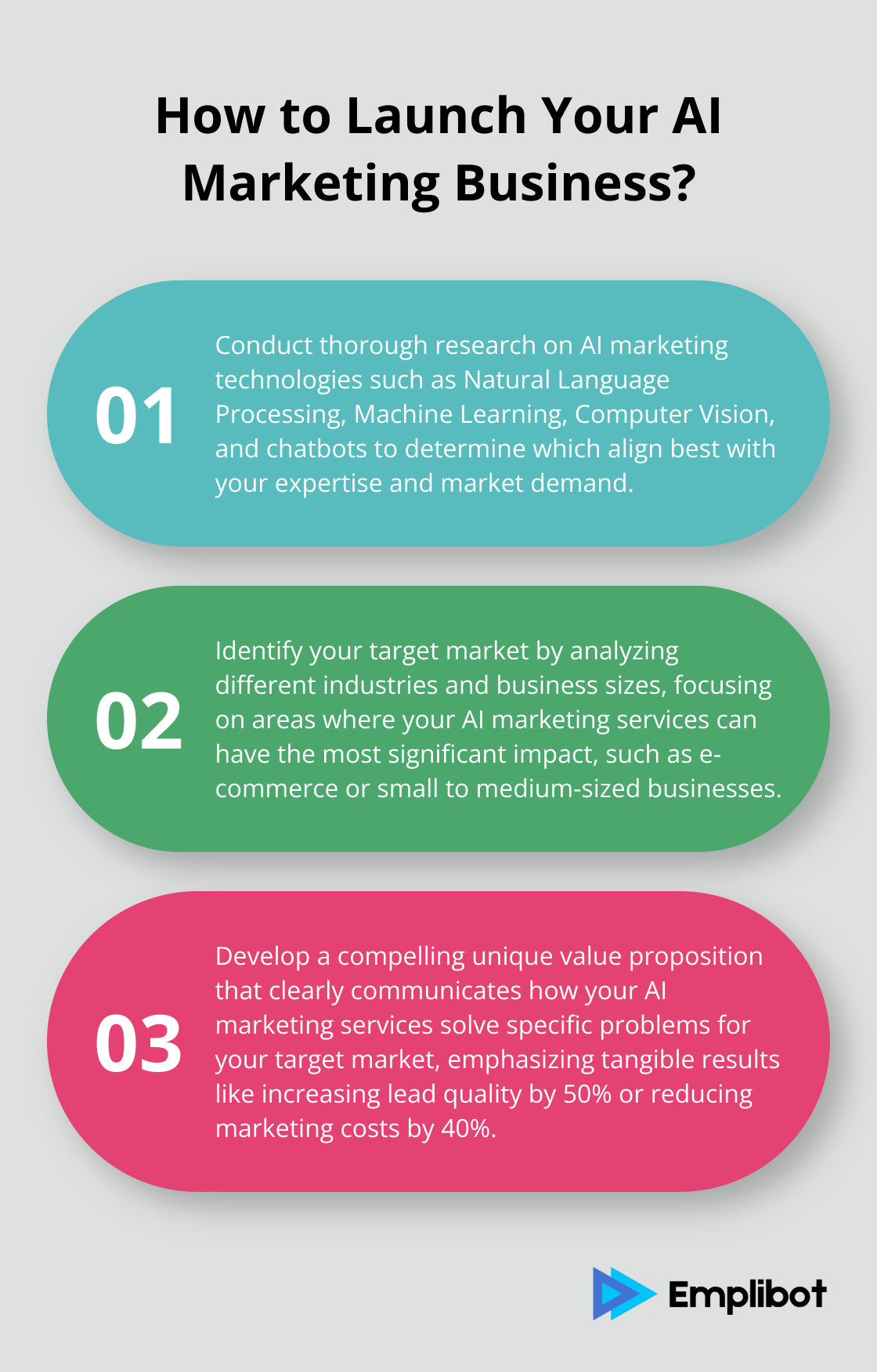
The AI landscape constantly evolves, so you must stay ahead of the curve. Update your knowledge regularly, attend industry events, and engage with the latest research to maintain a competitive edge. This commitment to learning will ensure your agency remains at the forefront of AI marketing innovation.
For those who want to streamline their content marketing efforts, Emplibot offers an automated solution that handles keyword research, content creation, and distribution. While Emplibot isn’t a social media management platform, it can enhance your agency’s content marketing capabilities. This allows you to focus on developing innovative AI strategies for your clients.






![Will AI Kill Blogging? [What You Need To Do Today]](https://wp.emplibot.com/wp-content/uploads/emplibot/ai-kills-blogging-1751008068-768x456.jpeg)



